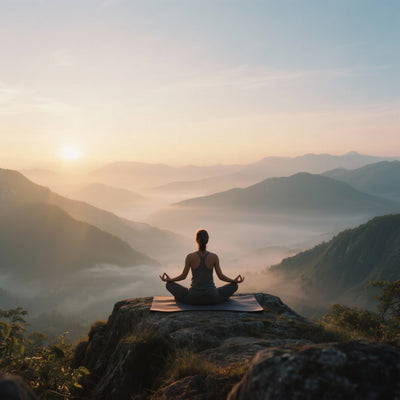How to Create an Energizing Morning Routine in 21 Days
The shrill sound of the alarm clock. The snooze button pressed once, twice, sometimes three times. A frantic race against time to get ready, gulp down a coffee, and plunge into the chaos of the day. If this scenario sounds familiar, you're not alone. For many, mornings are synonymous with stress and rushing rather than serenity and energy. But what if you could radically change this dynamic?
Imagine starting your day with calm, intention, and boundless energy. That's the promise of a well-designed morning routine. In this article, we'll guide you through a 21-day challenge to build, step by step, a morning ritual that reflects your personality and will transform not only your mornings but your entire day. Get ready to say goodbye to fatigue and hello to mindful productivity.
Why 21 Days? The Science Behind Habit Formation
The concept of "21 days to form a habit" is widespread, but where did it come from? It was popularized by Dr. Maxwell Maltz in the 1960s, who observed that his patients took approximately 21 days to adjust to their new appearance after cosmetic surgery. However, modern science paints a more nuanced picture.
A study from University College London revealed that it takes an average of 66 days for a new behavior to become automatic. So why focus on 21 days? Because this three-week period is a crucial and achievable first step. It's the anchoring phase, where you overcome initial resistance and begin to experience the first benefits, which is essential for long-term motivation.
"Motivation is what gets you started. Habit is what keeps you going."
Consider these 21 days not as a finish line, but as your launchpad. This is the time needed to prove to your brain that this change is beneficial and achievable, thus creating the new neural connections (neuroplasticity) that will solidify your routine for months and years to come.
The Foundations: Preparation is the Key to Success
A successful morning routine doesn't begin the morning of, but the night before. By preparing the ground, you eliminate the obstacles and friction that could derail you before you've even started.
The Evening Before: Your Springboard for Tomorrow
Spend 15 to 20 minutes each evening preparing for the next day. This small time reversal will save you precious time and, above all, significantly lighten your mental load in the morning.
- Prepare your belongings: Choose your clothes, pack your gym bag, gather your work documents.
- Plan your meals in advance: Prepare your lunch or breakfast ingredients. You might find some quick and healthy ideas on our recipe blog .
- Tidy up your space: A clean and tidy environment promotes a clear mind. Do the dishes, tidy the living room.
- Establish an "end of the day" routine: Turn off screens at least an hour before bed, read a few pages, listen to soft music. Good sleep is the foundation of an energetic morning.
Defining Your "Why": Your Morning Motivation
Why do you want to establish this routine? Without a deep, personal reason, it will be difficult to maintain it. Your "why" is your fuel when motivation wanes.
Take a notebook and answer these questions:
- What do I hope to gain from this routine? (More energy, less stress, more time for myself?)
- How will my life be different in 3 months if I stick to this?
- What version of myself do I want to embody?
Display your "why" in a visible place, such as on your bathroom mirror or as your phone's wallpaper. It's a powerful reminder of your commitment to yourself.
The 3-Phase Action Plan: Your 21-Day Challenge
We've broken the process down into three progressive weeks. The goal isn't perfection, but consistency. Choose one or two elements from each phase to start, then add more as you feel comfortable.
Week 1 (Days 1-7): Grounding
The goal of this first week is to establish fundamental, simple, and high-impact habits. Simplicity is key to avoiding feeling overwhelmed.
- Stop snoozing: Place your alarm clock on the other side of the room to force yourself to get up. It's the first commitment you'll make to yourself each day.
- Rehydrate immediately: Drink a large glass of water (room temperature or with lemon) as soon as you wake up to rehydrate your body after the night.
- Expose yourself to light: Open the curtains or step out onto your balcony for a few minutes. Natural light signals to your biological clock that it's time to wake up and stops melatonin production.
- Move gently: Do 5 to 10 minutes of gentle stretching to wake up your muscles and joints. Nothing complicated is needed, just listen to your body.
Week 2 (Days 8-14): Energizing
Now that the foundations are laid, it's time to incorporate elements that will actively boost your physical and mental energy.
- Physical activity: Incorporate 15 to 20 minutes of more intense movement. This could be a brisk walk, a few sun salutations, a short HIIT session, or a bike ride. The important thing is to get your heart rate up.
- Mindfulness: Take 5 to 10 minutes for a mindfulness practice. Guided meditation, deep breathing exercises (such as heart coherence), or simply sitting in silence and observing your thoughts without judgment.
- Nutritious breakfast: Take the time to prepare and enjoy a breakfast that will give you sustained energy, rich in protein and good fats, rather than a sugar rush.
Week 3 (Days 15-21): Personalization
You now have a solid routine. This last week is dedicated to adapting it perfectly to your goals and passions. That's what will make it sustainable and enjoyable.
- Nourish your mind: Read a few pages of an inspiring book, listen to a podcast, or take an online course.
- Writing and reflection: Keep a gratitude journal, write down your goals for the day (the 3-priority rule is excellent), or practice free writing to clarify your thoughts. For more inspiration, explore the articles in our Lifestyle section.
- Work on a personal project: Use this precious time to make progress on something you are passionate about: learning a language, writing, developing a project, etc.
Overcoming Common Obstacles
Even with the best plans, challenges can arise. Anticipating these obstacles is the best way to avoid getting discouraged.
"I lack the motivation."
Motivation is a fluctuating emotion. Don't rely on it. Rely on discipline and the strength of your "why." Remember that action often precedes motivation. Start, even if you don't feel like it. After 5 minutes, momentum will take over.
"I missed one day, everything's ruined."
Absolutely not. The goal isn't an unbroken string of successes, but a generally positive trend. The golden rule is never to miss two days in a row . If you miss a day, forgive yourself and simply pick up where you left off the next day. Flexibility is a strength, not a weakness.
FAQ: Your Questions About Your Morning Routine
Do you have to get up at 5am to have an effective routine?
No. An effective morning routine isn't defined by the time you get up, but by the quality of the time you give yourself before external demands begin. The most important thing is to get up early enough to have time to complete your routine without stress, while ensuring a full night's sleep (7-9 hours for most adults).
What if I only have 15 minutes in the morning?
15 minutes is much better than none! Focus on the actions with the highest impact. Here's an example of an "express" routine:
- 1 min: Drink a glass of water.
- 2 min: Expose yourself to natural light while taking a few deep breaths.
- 7 min: Do some stretches or dynamic movements (jumping jacks, squats).
- 5 min: Define your 3 priorities for the day.
The key is consistency, not duration.
How to maintain this in the long term after the 21 days?
After 21 days, your routine should start to feel more natural. To maintain it, continue to adjust it according to the seasons and your needs. Regularly revisit your "why" to rekindle your enthusiasm. Share your commitment with a friend to feel accountable. Above all, pay attention to the benefits it brings you: it's the best form of positive reinforcement. For continued inspiration, feel free to regularly check our main blog .
Conclusion: Your Morning, Your Day, Your Life
Building an energizing morning routine isn't a luxury, but a fundamental investment in your physical and mental well-being. By taking control of the first hour of your day, you set the tone for everything that follows. The 21-day challenge is just the beginning of a journey toward a more intentional and fulfilling life.
So, are you ready to take on the challenge? Choose just one small change from week 1 and commit to doing it tomorrow morning. It's the first step that counts the most. Your future self will thank you.











